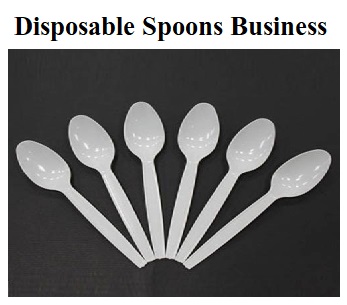
How To Start Disposable Items Business In India
Followers: 16 Views : 6301 Consultants : 1
1. INTRODUCTION
As per the Indian tradition are spoon is not preferable utensil, but with the influence of foreign culture, using knife and fork started in India also. Britishers leave some of their gears in India and using forks was one of them all. A spoon is basically a utensil that helps to eat/serve the liquid and semi solid eatable without creating mess. The concept behind the disposable spoons originated as when their huge gatherings of people or some events, where cleaning or serving that much number of utensils or spoons not possible. So, the disposable utensils are generated and started using by people. This business gets popular so quickly that it has increased much demand inn the market. Nowadays, disposable utensils and spoon manufacturing business has got its popularity worldwide and becomes profitable business.
The disposable manufacturing business has its major customer from the field of hotels/restaurants that uses disposable spoons in home delivery or packaging food, retail canteens, food vans, street hawkers, community centres, railways, flights etc. disposable spoons are mostly used in events like marriages, parties, receptions, college fests, social gatherings where chaos are gathered and food has to be served in the bulk.
2. CASE STUDY
# MEDE DISPOSABLE CUTLERY MANUFACTUREES: The company has been working for more than a decade and bulk manufacturer of utensils and cutlery. They produce of stainless steel, wood, plastic, natural solid with affordable pricing. After the succession of the brand achieving more clients they have made changes to their service and started offering customized services. They offer the services as per the clients demand and started getting customizing orders as per the price and the variety.
# ATMIYA MANUFACTURING: They are also the popular name in the Indian market in the manufacturing of plastic disposable spoons manufacturing machines. They are known for their advanced machines they used and the latest technological equipment they preferred in production. Those machine that are produced are highly accurate ,synchronised and greater production rate.
3. BUSINESS SWOT ANALYSIS
i). Strength
- # Limited start up risk.
- # Profit margin is flexible.
- # MSMEs can be set up.
ii). Weakness
- # Rate of production fully proportional to machine used.
- # Government put some restrictions and rules on using plastic items.
- # Transportation cost is high.
iii). Opportunity
- # Expanding online sales.
- # Development of additional stores and proprietary products.
- # Wholesale distribution supplier or distributors
iv). Threat
- # Government norms affect business.
- # Economic downturn.
4. MARKETING STRATEGY
# Technology expertise: For increasing the rate of production and the accuracy of the product make the used of the best tools and the machine. Th machines need to be calibrated precisely and of updated technology. Hire the expertise for the managing of the machine that are technology experts.
# Good packaging: Nowadays customers judged the brand by its packaging. So, make the packaging of the finished goods attractive as to attract more customers and the make the use of the graphics in them, which brings the brand more sophisticated.
# Coupons: For the regular customers and the new clients make the discount coupons available as to get engaged them, ibn the dealership of the business.
# Email marketing: Email marketing is the effective way of the marketing; in which client and the firm both stay updated with the recent products and the news. This is also the formal procedure of the marketing and communication with the dealers.
# Company website: Creating a website of the company is good way of presenting information, due to which customers and the dealers can get the sufficient data for the deals.
# Online sales: Online website can help in selling products easily and for this many sites are available like Alibaba, flip kart, amazon, snap-deal, and many more.
5. SUPPLY CHAIN MANAGEMENT
The basic steps for the supply chain are:
# Plan: The panning is the basic and first step for starting the disposable products business, in which their must be adequate knowledge and planning of customers demands. Their must be initial priority for the market supply, customers need, rate of producing spoons and most important service to be served.
# Source: The sourcing is collection of all tool, equipment, suppliers, raw material and all those things required for the production and packaging. Finding the best supplier of the raw material for the production and the packaging is the task. Also, the arrangements of all goods needed for the testing and the synchronizing.
# Manufacture: As all the materials are arranged, their starts the process of producing goods with them. As the production takes place other procedure is scheduled by testing, packaging and the synchronizing of the finished goods. These steps are followed by the quality control and rate of production which differs as per the company standards.
# Deliver: Delivering goods is the next steps after the finished goods are on the track of the departure, their follows the logistic step of delivery. This logistic step to be done properly as goods need to be loaded more or less as per the demand of market there and that need to be studied previously.
# Return: This step usually takes place at last but cycle repeats after this stage.as the defective or damaged pieces are returned to the firm followed by exchanged of undamaged products, sometimes payment need to be returned. As this process must need strong network of logistic and the suppliers so that delivery and exchanged must be on accurate without delay.
6. FINANCIAL EXPENSES
- # Manufacturing place
- # Raw material (plastic that is polypropylene)
- # Injection moulding machine
- # Mould or dye
- # Labours
- # Electricity supply
- # Transportation facility
